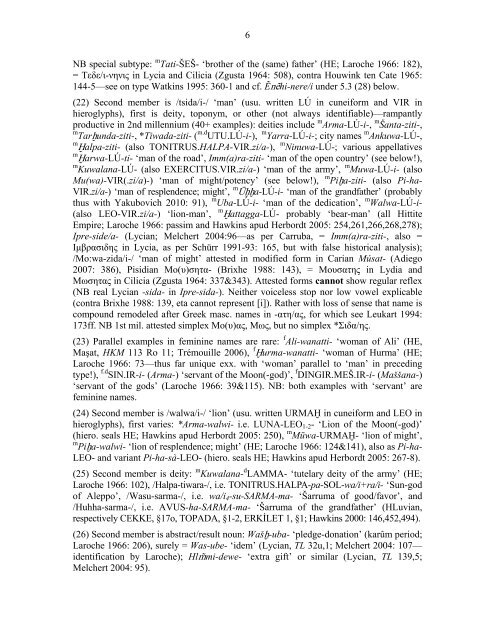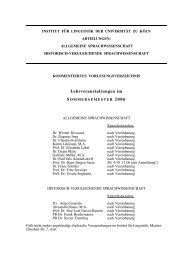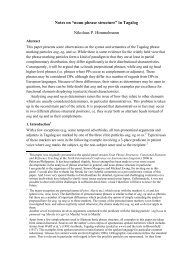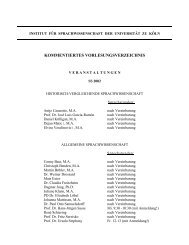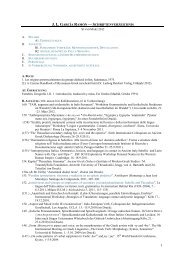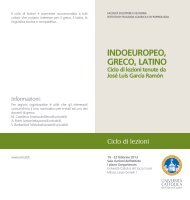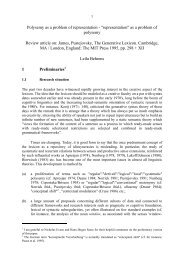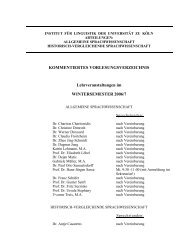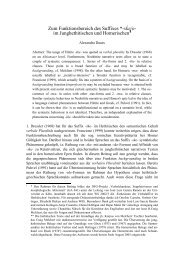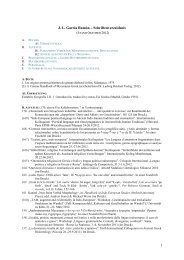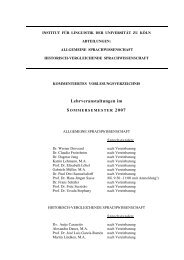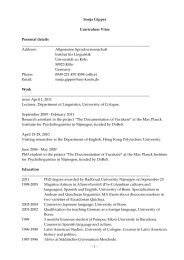Topics in Anatolian Historical Grammar Prof. Dr. H. Craig Melchert
Topics in Anatolian Historical Grammar Prof. Dr. H. Craig Melchert
Topics in Anatolian Historical Grammar Prof. Dr. H. Craig Melchert
You also want an ePaper? Increase the reach of your titles
YUMPU automatically turns print PDFs into web optimized ePapers that Google loves.
6<br />
NB special subtype: m Tati-ŠEŠ- ‘brother of the (same) father’ (HE; Laroche 1966: 182),<br />
= Τεδε/ι-νηνις <strong>in</strong> Lycia and Cilicia (Zgusta 1964: 508), contra Houw<strong>in</strong>k ten Cate 1965:<br />
144-5—see on type Watk<strong>in</strong>s 1995: 360-1 and cf. Enẽhi-nere/i under 5.3 (28) below.<br />
(22) Second member is /tsida/i-/ ‘man’ (usu. written LÚ <strong>in</strong> cuneiform and VIR <strong>in</strong><br />
hieroglyphs), first is deity, toponym, or other (not always identifiable)—rampantly<br />
productive <strong>in</strong> 2nd millennium (40+ examples): deities <strong>in</strong>clude m Arma-LÚ-i-, m Šanta-ziti-,<br />
m Tarḫunda-ziti-, *Tiwada-ziti- ( m.d UTU.LÚ-i-), m Yarra-LÚ-i-; city names m Ankuwa-LÚ-,<br />
m Ḫalpa-ziti- (also TONITRUS.HALPA-VIR.zi/a-), m N<strong>in</strong>uwa-LÚ-; various appellatives<br />
m Ḫarwa-LÚ-ti- ‘man of the road’, Imm(a)ra-ziti- ‘man of the open country’ (see below!),<br />
m Kuwalana-LÚ- (also EXERCITUS.VIR.zi/a-) ‘man of the army’, m Muwa-LÚ-i- (also<br />
Mu(wa)-VIR(.zi/a)-) ‘man of might/potency’ (see below!), m Piḫa-ziti- (also Pi-ha-<br />
VIR.zi/a-) ‘man of resplendence; might’, m Ūḫḫa-LÚ-i- ‘man of the grandfather’ (probably<br />
thus with Yakubovich 2010: 91), m Uba-LÚ-i- ‘man of the dedication’, m Walwa-LÚ-i-<br />
(also LEO-VIR.zi/a-) ‘lion-man’, m Ḫattagga-LÚ- probably ‘bear-man’ (all Hittite<br />
Empire; Laroche 1966: passim and Hawk<strong>in</strong>s apud Herbordt 2005: 254,261,266,268,278);<br />
Ipre-side/a- (Lycian; <strong>Melchert</strong> 2004:96—as per Carruba, = Imm(a)ra-ziti-, also =<br />
Ιμβρασιδης <strong>in</strong> Lycia, as per Schürr 1991-93: 165, but with false historical analysis);<br />
/Mo:wa-zida/i-/ ‘man of might’ attested <strong>in</strong> modified form <strong>in</strong> Carian Músat- (Adiego<br />
2007: 386), Pisidian Μο(υ)σητα- (Brixhe 1988: 143), = Μουσατης <strong>in</strong> Lydia and<br />
Μωσητας <strong>in</strong> Cilicia (Zgusta 1964: 337&343). Attested forms cannot show regular reflex<br />
(NB real Lycian -sida- <strong>in</strong> Ipre-sida-). Neither voiceless stop nor low vowel explicable<br />
(contra Brixhe 1988: 139, eta cannot represent [i]). Rather with loss of sense that name is<br />
compound remodeled after Greek masc. names <strong>in</strong> -ατη/ας, for which see Leukart 1994:<br />
173ff. NB 1st mil. attested simplex Μο(υ)ας, Μως, but no simplex *Σιδα/ης.<br />
(23) Parallel examples <strong>in</strong> fem<strong>in</strong><strong>in</strong>e names are rare: f Ali-wanatti- ‘woman of Ali’ (HE,<br />
Maşat, HKM 113 Ro 11; Trémouille 2006), f Ḫurma-wanatti- ‘woman of Hurma’ (HE;<br />
Laroche 1966: 73—thus far unique exx. with ‘woman’ parallel to ‘man’ <strong>in</strong> preced<strong>in</strong>g<br />
type!), f.d SIN.IR-i- (Arma-) ‘servant of the Moon(-god)’, f DINGIR.MEŠ.IR-i- (Maššana-)<br />
‘servant of the gods’ (Laroche 1966: 39&115). NB: both examples with ‘servant’ are<br />
fem<strong>in</strong><strong>in</strong>e names.<br />
(24) Second member is /walwa/i-/ ‘lion’ (usu. written URMAḪ <strong>in</strong> cuneiform and LEO <strong>in</strong><br />
hieroglyphs), first varies: *Arma-walwi- i.e. LUNA-LEO 1-2 - ‘Lion of the Moon(-god)’<br />
(hiero. seals HE; Hawk<strong>in</strong>s apud Herbordt 2005: 250), m Mūwa-URMAḪ- ‘lion of might’,<br />
m Piḫa-walwi- ‘lion of resplendence; might’ (HE; Laroche 1966: 124&141), also as Pi-ha-<br />
LEO- and variant Pi-ha-sà-LEO- (hiero. seals HE; Hawk<strong>in</strong>s apud Herbordt 2005: 267-8).<br />
(25) Second member is deity: m Kuwalana- d LAMMA- ‘tutelary deity of the army’ (HE;<br />
Laroche 1966: 102), /Halpa-tiwara-/, i.e. TONITRUS.HALPA-pa-SOL-wa/i+ra/i- ‘Sun-god<br />
of Aleppo’, /Wasu-sarma-/, i.e. wa/i 4 -su-SARMA-ma- ‘Šarruma of good/favor’, and<br />
/Huhha-sarma-/, i.e. AVUS-ha-SARMA-ma- ‘Šarruma of the grandfather’ (HLuvian,<br />
respectively CEKKE, §17o, TOPADA, §1-2, ERKİLET 1, §1; Hawk<strong>in</strong>s 2000: 146,452,494).<br />
(26) Second member is abstract/result noun: Wašḫ-uba- ‘pledge-donation’ (karûm period;<br />
Laroche 1966: 206), surely = Was-ube- ‘idem’ (Lycian, TL 32u,1; <strong>Melchert</strong> 2004: 107—<br />
identification by Laroche); Hlmi-dewe- ‘extra gift’ or similar (Lycian, TL 139,5;<br />
<strong>Melchert</strong> 2004: 95).


